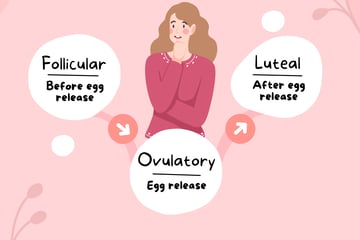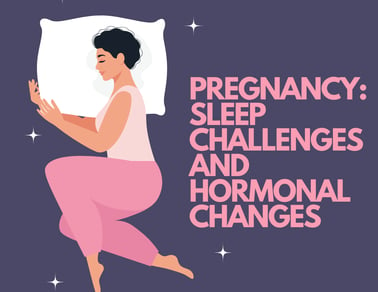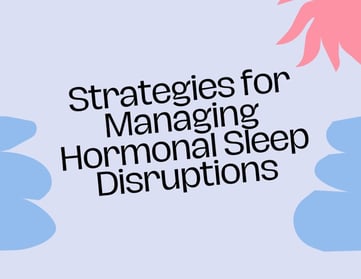"The Influence of Hormones on Women's Sleep Patterns."
Hormones play a crucial role in regulating various bodily functions, including sleep. For women, hormonal fluctuations throughout different life stages can significantly impact sleep patterns. Research indicates that these hormonal changes can affect both the quality and duration of sleep, leading to periods of insomnia or disturbed sleep. Understanding these influences can help women manage their sleep more effectively and improve overall health.
"THE INFLUENCE OF HORMONES ON WOMEN'S SLEEP PATTERNS."
Dr. Kirti Dhuria
7/2/20243 min read
Menstrual Cycle and Sleep Patterns
The menstrual cycle has a profound impact on women's sleep. During the menstrual cycle, women experience cyclical fluctuations in estrogen and progesterone levels, which can affect sleep quality. The luteal phase, in particular, is associated with increased sleep disturbances due to elevated progesterone levels, which can cause increased body temperature and night sweats.
Studies have shown that women are more likely to experience insomnia and poor sleep quality in the days leading up to menstruation. This period, known as the premenstrual phase, can also bring about mood swings and anxiety, further complicating sleep patterns. Addressing these hormonal influences through lifestyle changes and, in some cases, medical interventions can help mitigate the adverse effects on sleep.
Pregnancy: Sleep Challenges and Hormonal Changes
Pregnancy is a time of significant hormonal upheaval, and these changes can dramatically impact sleep patterns. Increased levels of estrogen and progesterone are essential for maintaining pregnancy but can also lead to sleep disruptions. Progesterone, for example, has a sedative effect, which can increase daytime sleepiness but may not necessarily improve nighttime sleep quality.
Additionally, physical discomfort, frequent urination, and anxiety about impending motherhood can contribute to sleep disturbances during pregnancy. Research suggests that nearly 78% of pregnant women experience sleep problems. Understanding these hormonal and physiological changes can help in developing strategies to improve sleep, such as adjusting sleep positions, maintaining a regular sleep schedule, and practicing relaxation techniques.
Menopause and Sleep Disturbances
Menopause marks a significant shift in a woman’s hormonal balance, often leading to sleep disturbances. The decline in estrogen and progesterone levels during menopause can cause hot flashes and night sweats, which are common culprits of disrupted sleep. Studies indicate that up to 61% of postmenopausal women experience insomnia and other sleep-related issues.
Moreover, the decrease in these hormones can lead to increased stress levels and mood disorders, further complicating sleep patterns. Hormone replacement therapy (HRT) has been shown to alleviate some of these symptoms, thereby improving sleep quality for many women. However, it is essential to weigh the benefits and risks of HRT with a healthcare provider.
Strategies for Managing Hormonal Sleep Disruptions
Understanding the impact of hormones on sleep can empower women to take proactive steps to manage their sleep health. Maintaining a consistent sleep schedule, practicing good sleep hygiene, and managing stress through techniques like yoga and meditation can all contribute to better sleep. Additionally, dietary adjustments and regular exercise can help regulate hormonal fluctuations and improve sleep quality.
For those experiencing severe sleep disturbances, consulting with a healthcare provider is crucial. Treatments may include cognitive-behavioral therapy for insomnia (CBT-I), hormone replacement therapy, or other medical interventions tailored to the individual's hormonal and sleep needs. By addressing the root causes of hormonal sleep disruptions, women can achieve better sleep and improved overall well-being.
Conclusion: Hormones and Women’s Sleep Health
Hormonal fluctuations are a significant factor in women's sleep patterns, affecting them throughout different life stages. From the menstrual cycle to pregnancy and menopause, these changes can lead to various sleep disturbances. By understanding the connection between hormones and sleep, women can implement strategies to improve their sleep quality and overall health. Scientific research supports the importance of addressing these hormonal influences to promote better sleep hygiene and well-being. With the right approach, women can navigate these changes and achieve restorative sleep.
Dr. Kirti Dhuria












